Meetings
Call for Participation: CUNY DHI Lightning Talks 2018 (Deadline November 6)
On 22, Oct 2018 | In Meetings | By Javier Otero Peña
Come present your digital projects, ongoing digital humanities work, or research questions at the Fourth Annual CUNY Digital Humanities Initiative Lightning Talks event.
When: Tuesday, November 13, 2018 from 6:30 to 8:30 PM
Who: All CUNY Students, Faculty, and Staff
Where: The Graduate Center, CUNY, Room C198
What: Present your digital humanities project, research, or questions during a 3-minute / 3-slide “lightning” talk. Lightning talks offer a very brief insight into your ongoing digital humanities project, research, or activity to a community of engaged CUNY colleagues.
How to participate: Sign up using this form before November 6th.
Don’t miss this year’s CUNY DHI event, featuring a keynote lecture by Kim Knight titled “Wearable Interfaces and Feminist Sleeper Agents.” Following the keynote, CUNY students, faculty, and staff will share their projects through short 3-minute, 3 slide talks, showcasing the diverse and innovative digital humanities projects happening across the CUNY system. We invite individual students, faculty, staff or groups from all disciplines to join more than 50 scholars who have already shared their projects in previous CUNY DHI events (learn more about some of these projects in the CUNY DHI website). We welcome first-time presenters, as well as those who have participated in past CUNY DHI Lightning Talks.
Reception to follow in Room 5307. This event is free and open to the public.
Please share this call widely with friends and colleagues whom you think might be interested in joining the CUNY Digital Humanities Initiative to present their work.
We look forward to seeing you there and to welcoming you into the CUNY DHI community!
Deadline: November 6th, 2018
For specific questions, please contact us at lrhody@gc.cuny.edu or joteropena@gradcenter.cuny.edu.
Books Matter: Circulating Digital and Printed Texts (3/27/15)
On 26, Mar 2015 | In Meetings | By Matthew K. Gold
Please join the Ph.D. Program in English, GC Digital Initiatives, and CUNY DHI on Friday, March 27 2015 from 4pm-6pm (Room 4406, Graduate Center, CUNY):
Books Matter: Circulating Digital and Printed Texts
What is the place of the printed book in an era of digital reading devices and web-based publishing, and how have digital workflows changed academic publishing? How are digital texts circulating in new and varied forms? This roundtable will explore how the growth of digital media has altered the material form of the printed book and posed new challenges for institutions, such as libraries, that are focused on providing access to them.
Jeffrey Binder, Graduate Center, CUNY
Erin Glass, Graduate Center, CUNY
Matthew K. Gold, Graduate Center, CUNY
Steve Jones, Loyola University Chicago
Andrew Stauffer, University of Virginia
Marion Thain, New York University
Reception to follow
Fall 2014 Speaker Series
On 03, Sep 2014 | In Events of Interest, Meetings | By Amanda Licastro
The CUNY Digital Humanities Initiative is happy to announce our Fall 2014 Speaker Series. All events are free and open to the public.
- Thursday, Sept 4, 4-6pm, Room 5318 : Elizabeth Maddock-Dillon on “Radical Archival Practices and the Digital Humanities: the Early Caribbean Archive”
- Thursday, Sept 11, 6:30-8:30pm, Room 5409 : Cheryl Ball, West Virgina University, on Making the Case for Scholarly Multimedia, co-sponsored with the GC Composition Community.
- Friday, Oct 10, 4:00pm, Room 4406: What Is a Dissertation? New Models, New Methods, New Media, a panel including: Jade E. Davis, Communications, University of North Carolina, Dwayne Dixon, Anthropology, Duke University, Gregory T. Donovan, Communication and Media Studies, Fordham University, Amanda Licastro, English, Graduate Center, CUNY, and Nick Sousanis, Teachers College, Columbia University.
- Wednesday, Oct 15, 6:30pm, Room C198: Destruction and Documentation: Saving Syria’s Cultural Heritage, Elizabeth Macaulay-Lewis, The Graduate Center, CUNY. Co-sponsored with the Center of Humanities.
- TBA: A showcase of CUNY Digital Humanities projects across the campuses
Thursday, Sept 11, 6:30pm : Cheryl Ball on Making the Case for Scholarly Multimedia
On 02, Sep 2014 | In Events of Interest, Meetings | By Amanda Licastro
The CUNY Digital Humanities Initiative is pleased to announce Dr. Cheryl E. Ball, West Virginia University, will join us for a presentation and workshop on “Making the Case for Scholarly Multimedia.” This event is co-sponsored by the Graduate Center Composition Community. We encourage participants to bring their works-in-progress to workshop as webtext submissions to Kairos. This event is free and open to the public, and will take place in room 5409 of the Graduate Center.
Please RSVP to gc.comprhet@gmail.com
Thursday, Sept 11, 6:30pm, Room 5409 : Cheryl Ball on Making the Case for Scholarly Multimedia
In this presentation/workshop, Dr. Ball will briefly overview what “scholarly multimedia” is, the kinds of peer-reviewed journals it is published in, and how it relates to others kinds of digital humanities and digital media projects. Following this introduction, Ball will focus on helping participants make the case for their (or others’) digital media-based work through an interactive assessment workshop. We will start with a single webtext, go through some of the developmental and evaluative stages of feedback that Ball uses at Kairos, and spin that example out into relevant cases and questions the workshop participants might have.
 Cheryl E. Ball is Associate Professor of Digital Publishing Studies at West Virginia University and editor of Kairos: A Journal of Rhetoric, Technology, and Pedagogy. She teaches classes in editing, multimedia authoring, and digital publishing and teaches occasional seminars on academic literacies at the Oslo School of Architecture and Design, where she was a Fulbright scholar in 2013-14. Ball has published articles in Classroom Discourse, Computers and Composition, C&C Online, Fibreculture, Convergence, Hybrid Pedagogy, Kairos, Programmatic Perspectives, Technical Communication Quarterly, and Writing & Pedagogy. She has also published several books, including The New Work of Composing (co-edited with Debra Journet and Ryan Trauman), which won the C&C Distinguished Book Award in 2013, and the RAW: Reading and Writing New Media (co-edited with Jim Kalmbach). Her textbooks include ix: visual exercises and Writer/Designer: A Guide to Making Multimodal Projects (with Kristin Arola and Jenny Sheppard).
Cheryl E. Ball is Associate Professor of Digital Publishing Studies at West Virginia University and editor of Kairos: A Journal of Rhetoric, Technology, and Pedagogy. She teaches classes in editing, multimedia authoring, and digital publishing and teaches occasional seminars on academic literacies at the Oslo School of Architecture and Design, where she was a Fulbright scholar in 2013-14. Ball has published articles in Classroom Discourse, Computers and Composition, C&C Online, Fibreculture, Convergence, Hybrid Pedagogy, Kairos, Programmatic Perspectives, Technical Communication Quarterly, and Writing & Pedagogy. She has also published several books, including The New Work of Composing (co-edited with Debra Journet and Ryan Trauman), which won the C&C Distinguished Book Award in 2013, and the RAW: Reading and Writing New Media (co-edited with Jim Kalmbach). Her textbooks include ix: visual exercises and Writer/Designer: A Guide to Making Multimodal Projects (with Kristin Arola and Jenny Sheppard).
Matthew G. Kirschenbaum, “Track Changes: The Literary History of Word Processing” – Oct 15, 4:15-5:30pm – Room C204/C205
On 14, Oct 2013 | In Meetings | By Matthew K. Gold
Please join us for a talk by Matthew Kirschenbaum on his forthcoming book project, which was recently profiled in the New York Times: The Muses of Insert, Delete and Execute. Matt’s visit is made possible by the Office of the Provost at the Graduate Center and is being made in connection with the Digital Praxis Seminar.
This event will take place on Tuesday, October 15, 2013 from 4:15-5:30pm at the Graduate Center, CUNY in C204/205 (Concourse Level). Please join us!
—
Track Changes: The Literary History of Word Processing
Mark Twain famously prepared the manuscript for Life on the Mississippi (1883) with his new Remington typewriter, the first literary text ever submitted to a publisher in typewritten form. Today we recognize that the typewriter changed the history and material culture of authorship. But when did writers begin using word processors? Who were the early adopters? How did the technology change their relationship to their craft? Was the computer just a better typewriter—faster, easier to use—or was it something more? And what will be the fate of today’s “manuscripts,” which take the form of electronic files in folders on hard drives, instead of papers in hard copy? This talk, drawn from the speaker’s forthcoming book on the subject, will provide some answers, and also address questions related to the challenges of conducting research at the intersection of literary and technological history.
—
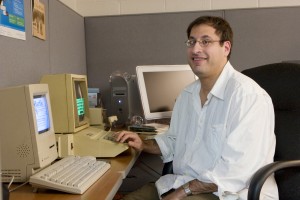 Matthew G. Kirschenbaum is Associate Professor in the Department of English at the University of Maryland and Associate Director of the Maryland Institute for Technology in the Humanities (MITH, an applied thinktank for the digital humanities). He is also an affiliated faculty member with the College of Information Studies at Maryland, and a member of the teaching faculty at the University of Virginia’s Rare Book School. His first book, Mechanisms: New Media and the Forensic Imagination, was published by the MIT Press in 2008 and won the 2009 Richard J. Finneran Award from the Society for Textual Scholarship (STS), the 2009 George A. and Jean S. DeLong Prize from the Society for the History of Authorship, Reading, and Publishing (SHARP), and the 16th annual Prize for a First Book from the Modern Language Association (MLA). In 2010 he co-authored (with Richard Ovenden and Gabriela Redwine) Digital Forensics and Born-Digital Content in Cultural Heritage Collections, a report published by the Council on Library and Information Resources and recognized with a commendation from the Society of American Archivists.Kirschenbaum speaks and writes often on topics in the digital humanities and new media; his work has received coverage in the Atlantic, Slate, New York Times, The Guardian, National Public Radio, Wired, Boing Boing, Slashdot, and the Chronicle of Higher Education. His current book project is entitled Track Changes: A Literary History of Word Processing, and is under contract to Harvard University Press. He is a 2011 Guggenheim Fellow. See http://www.mkirschenbaum.net for more.
Matthew G. Kirschenbaum is Associate Professor in the Department of English at the University of Maryland and Associate Director of the Maryland Institute for Technology in the Humanities (MITH, an applied thinktank for the digital humanities). He is also an affiliated faculty member with the College of Information Studies at Maryland, and a member of the teaching faculty at the University of Virginia’s Rare Book School. His first book, Mechanisms: New Media and the Forensic Imagination, was published by the MIT Press in 2008 and won the 2009 Richard J. Finneran Award from the Society for Textual Scholarship (STS), the 2009 George A. and Jean S. DeLong Prize from the Society for the History of Authorship, Reading, and Publishing (SHARP), and the 16th annual Prize for a First Book from the Modern Language Association (MLA). In 2010 he co-authored (with Richard Ovenden and Gabriela Redwine) Digital Forensics and Born-Digital Content in Cultural Heritage Collections, a report published by the Council on Library and Information Resources and recognized with a commendation from the Society of American Archivists.Kirschenbaum speaks and writes often on topics in the digital humanities and new media; his work has received coverage in the Atlantic, Slate, New York Times, The Guardian, National Public Radio, Wired, Boing Boing, Slashdot, and the Chronicle of Higher Education. His current book project is entitled Track Changes: A Literary History of Word Processing, and is under contract to Harvard University Press. He is a 2011 Guggenheim Fellow. See http://www.mkirschenbaum.net for more.
David Mimno on Topic Modeling with MALLET, September 30th, 4:15-5:30pm
On 29, Sep 2013 | In Meetings | By Matthew K. Gold
Please join CUNY DHI and the Digital Praxis Seminar for a talk by David Mimno on Topic Modeling with MALLET.
This event will take place on Monday, September 30, 2013 from 4:15-5:30pm at the Graduate Center, CUNY in the 9th floor Skylight Room.
Details are below – we look forward to seeing you there! Please RSVP here.
In the last ten years we have seen the creation of massive digital text collections, from Twitter feeds to million-book libraries, all in dozens of languages. At the same time, researchers have developed text mining methods that go beyond simple word frequency analysis to uncover thematic patterns. When we combine big data with powerful algorithms, we enable analysts in many different fields to enhance qualitative perspectives with quantitative measurements. But these methods are only useful if we can apply them at massive scale and distinguish consistent patterns from random variations. In this talk I will describe my work building reliable topic modeling methodologies for humanists, social scientists and science policy officers.
Bio:
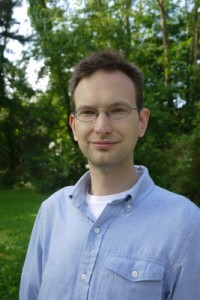 David Mimno is an assistant professor in the Information Science department at Cornell University. His research is on developing machine learning models and algorithms, with a particular focus on applications in Humanities and Social Science. He received his BA in Classics and Computer Science from Swarthmore College and PhD in Computer Science from the University of Massachusetts, Amherst. He was a CRA Computing Innovation fellow at Princeton University. Before graduate school, he served as Head Programmer at the Perseus Project, a digital library for cultural heritage materials, at Tufts University. Mimno is currently chief architect for the MALLET machine learning toolkit.
David Mimno is an assistant professor in the Information Science department at Cornell University. His research is on developing machine learning models and algorithms, with a particular focus on applications in Humanities and Social Science. He received his BA in Classics and Computer Science from Swarthmore College and PhD in Computer Science from the University of Massachusetts, Amherst. He was a CRA Computing Innovation fellow at Princeton University. Before graduate school, he served as Head Programmer at the Perseus Project, a digital library for cultural heritage materials, at Tufts University. Mimno is currently chief architect for the MALLET machine learning toolkit.
CUNY Digital Humanities Initiative Fall 2013 Semester Schedule
On 28, Sep 2013 | In Meetings | By Matthew K. Gold
We’re delighted to present our Fall 2013 CUNY DHI Speaker Series Schedule, which this year includes events associated with the Graduate Center’s Digital Praxis Seminar. All talks take place at The Graduate Center, CUNY, located on 5th Avenue between 34th and 35th. Please join us!
Lev Manovich on Data Visualization
Mon 9/23, 4:15pm-5:30pm, C415A: Lev Manovich (Graduate Center, CUNY) on Data Visualization
David Mimno on Topic Modeling
Mon 9/30, 4:15pm-5:30pm, Skylight Room 9100: David Mimno (Cornell) on Topic Modeling with MALLET
Doug Eyman & Collin Brooke on DH and Rhetoric
Tues 10/8, 6:30pm-8:30pm, Room C415A: Doug Eyman (George Mason University) on “Digital Rhetoric and the Infrastructure of DH” and Collin Brooke (Syracuse University) on “Too Big to Scale? Culturomics and Crypto-Rhetorics”
Matthew Kirschenbaum on Word Processing
Tues 10/15, 4:15pm-5:30pm, Room C204/C205: Matthew Kirschenbaum (University of Maryland) on “Track Changes: The Literary History of Word Processing”
William Turkel on Physical Computing and the Humanities
Mon 10/21, 4:15pm-5:30pm, Skylight Room (9100): William Turkel (Western University Ontario) on humanistic fabrication and physical computing
Larry Smarr on Digital Culture and the Future Internet
Wed 10/30, 6:00pm-8:00pm, Room C205: Larry Smarr (California Institute for Telecommunications and Information Technology (Calit2)) on “Digital Culture and the Future Internet”
Kathleen Fitzpatrick on Scholarly Communication
Mon 11/4, 4:15pm-5:30pm, Room 9206/9207: Kathleen Fitzpatrick (Modern Language Association) on scholarly communication
Ray Siemens on the Digital Social Edition
Mon 11/13, 4:15p-5:30p Rooms C204/C205: Ray Siemens (University of Victoria) on the Digital Social Edition
Katina Rogers on Alt-Academic Careers
Mon 11/18, 4:15p-5:30p Rooms 9204/9205: Katina Rogers (Modern Language Association) on Alt-Academic Careers
Tom Scheinfeldt on DH Project Management
Mon 11/25, 4:15pm-5:30pm, Skylight Room (9100): Tom Scheinfeldt (University of Connecticut) on managing DH projects
Simone Browne on Race, Surveillance, and Technology
Mon 12/9, 4:15pm-5:30pm, Skylight Room (9100): Simone Browne (University of Texas at Austin) on race, surveillance, and technology
May 2: Beth Harris (Khan Academy) “Art History Education Goes Digital: The Problem (& Promise) of the Digital Image”
On 25, Apr 2013 | In Meetings | By Charlie Edwards
Please join us on Thursday May 2, 2013 for our final event of the semester: we are excited to welcome Beth Harris, co-Dean with Steven Zucker of Art and History at the Khan Academy. She and Dr. Zucker are Executive Editors of Smarthistory at Khan Academy, an open educational resource for art history that they co-founded (as smarthistory.org) in 2005.
Details are below – we look forward to seeing you there!
Beth Harris
“Art History Education Goes Digital: The Problem (& Promise) of the Digital Image”
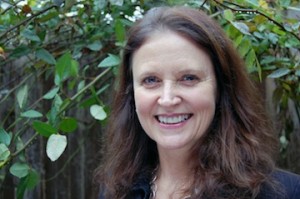 Thursday May 2, 2013, 6:30pm-8:30pm
Thursday May 2, 2013, 6:30pm-8:30pm
CUNY Graduate Center, Room 6421
Co-sponsored by the Master of Arts Program in Liberal Studies, CUNY Graduate Center.
Please register here: http://cunydhi-bethharris.eventbrite.com/
The event is free and open to the public; registration is not mandatory.
Images may be everywhere, but we are doing very little to educate our students about their history and how to engage images critically. This deficiency is compounded by the fact that open access to digital reproductions of cultural heritage objects in the public domain is still many years away. Museums—the institutions that own many of these works of art and often control the best images—remain committed to print publications, and use the web primarily for marketing. At Smarthistory, we have been trying to fill this void, asking how can we best use the web for art history education. Can we scale (with MOOCs in mind) humanities education? Can we make art history more engaging by making it more conversational and experiential while taking advantage of the proliferation of images and video that can contextualize the work of art? How can art history help other disciplines to use images more responsibly?
About Beth Harris:
Dr. Beth Harris is co-Dean with Steven Zucker of Art and History at the Khan Academy. Before joining the Khan Academy, she was the first person to hold the position of Director of Digital Learning at The Museum of Modern Art, where she started MoMA Courses Online. She also co-produced educational videos, websites and apps. Before joining MoMA, Beth was Associate Professor and Director of Distance Learning at the Fashion Institute of Technology where she taught both online and in the classroom. Her scholarly work includes editing and contributing to Famine and Fashion: Needlewomen in the Nineteenth Century (Ashgate, 2005), many book reviews, and “The Slide Library: A Posthumous Assessment in the Service of Our Digital Future,” in Teaching Art History with Technology: Case Studies (2008). She received her Master’s degree from the Courtauld Institute of Art in London, and her Doctorate in Art History from the Graduate Center of the City University of New York.
April 17: Arienne Dwyer (University of Kansas) “Using Languages as Historical Sources”
On 29, Mar 2013 | In Meetings | By Charlie Edwards
Please join us on Wednesday April 17, 2013 for a special presentation by Arienne M. Dwyer, Visiting Professor of Digital Humanities at CUNY Graduate Center and Professor of Linguistic Anthropology and Co-Director, Institute for Digital Research in the Humanities, University of Kansas. Details are below – we look forward to seeing you there!
Arienne Dwyer
“Using Languages as Historical Sources”
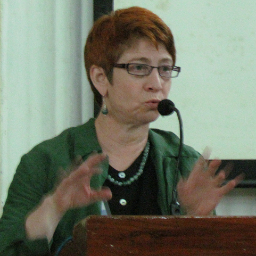 Wednesday April 17, 2013, 6:30pm-8:30pm
Wednesday April 17, 2013, 6:30pm-8:30pm
CUNY Graduate Center, Room 3212
Please register here http://using_languages.eventbrite.com
The event is free and open to the public; registration is not mandatory.
Clues to the history of diaspora communities and contacts with other peoples and ecosystems are embedded like fossils in the bedrock of language. Historians rarely if ever make use of this kind of historical information, while historical linguists only use it to investigate language, not culture. This talk will use ethnohistorical, linguistic and digital humanities techniques to illustrate how spoken narratives and even conversations can help us understand cultural historical patterns.
About Arienne Dwyer:
Professor Dwyer is Visiting Professor of Digital Humanities at CUNY Graduate Center and Professor of Linguistic Anthropology and Co-Director, Institute for Digital Research in the Humanities, University of Kansas. She has conducted more than two decades of in situ collaborative research with communities in Inner and Central Asia and China, and publishes extensively on ethnolinguistic contact and change, language endangerment, and language ideology. Her current research is in corpus linguistics, query interfaces, and language contact. She teaches documentary linguistics, language technologies, and digital humanities.
Thursday April 4: Kari Kraus (University of Maryland) “Experiments in Design Fiction”
On 28, Mar 2013 | In Meetings | By Charlie Edwards
On Thursday April 4, 2013 we are honored to host Kari Kraus (University of Maryland) for a discussion of her work with design fiction. Details are below – we look forward to seeing you there!
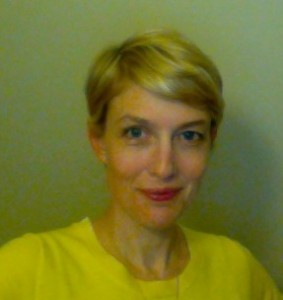 Kari Kraus (University of Maryland)
Kari Kraus (University of Maryland)
“Experiments in Design Fiction”
Thursday April 4, 2013, 6:30pm-8:30pm
CUNY Graduate Center, Room 6421
Please register here: http://design_fiction.eventbrite.com/. The event is free and open to the public, registration is not mandatory.
The last few years have seen a growing interest in future-oriented and speculative design in areas as diverse as media archaeology, human-computer interaction, and alternate reality game design. The application domains are equally diverse, extending to public policy, entertainment, and commercial product development. In this talk I show and discuss some of the low-tech design fiction experiments my collaborators, students, and I have undertaken since 2010, with an emphasis on methodological mashups that cut across the arts & humanities, the social sciences, and the design disciplines. A larger objective of the talk is to think through what an interdisciplinary research and teaching program in long-term thinking that incorporates technology and humanistic design as critical components might look like.
About Kari Kraus:
Kari Kraus is an Assistant Professor in the College of Information Studies and the Department of English at the University of Maryland. Her research and teaching interests focus on digital humanities, game studies and transmedia fiction, and digital preservation. She is currently writing a book under contract to the MIT Press on long-term thinking and design.




 Welcome to the blog of the CUNY DHI, an effort to build momentum and community around Digital Humanities practitioners at CUNY. We hope you'll join us at our upcoming events and that you'll follow this blog to hear about the latest news in the field.
Welcome to the blog of the CUNY DHI, an effort to build momentum and community around Digital Humanities practitioners at CUNY. We hope you'll join us at our upcoming events and that you'll follow this blog to hear about the latest news in the field.



Recent Comments